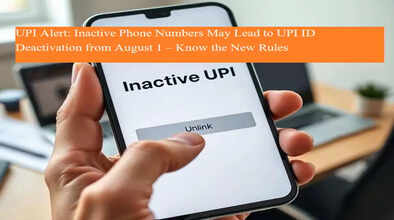UPI Alert: Inactive Phone Numbers May Lead to UPI ID Deactivation from August 1 – Know the New Rules

New UPI Rules from August 1: Deactivation Risk for Inactive Numbers, Daily Balance Check Limit Introduced
Starting August 1, 2025, major changes are coming to India’s widely used Unified Payments Interface (UPI) system. If you’re among the millions who rely on apps like PhonePe, Google Pay, or Paytm for daily transactions, it’s crucial to pay attention. The National Payments Corporation of India (NPCI) has announced a set of updated guidelines aimed at improving security, reducing server load, and streamlining operations. Among the biggest changes: UPI IDs linked to inactive mobile numbers will be deactivated.
Let’s break down what this means for users and how you can avoid disruptions to your digital payments.
Why Your UPI ID May Be Deactivated
One of the key updates is targeted at phone numbers that haven’t been active for more than 90 days. According to NPCI, if your mobile number has remained unused or uncharged during this period, and it's linked to your UPI ID, you risk losing access to that UPI ID permanently. The rationale behind this move is simple — to protect users from fraud, prevent unauthorized access, and ensure the system isn’t overloaded by dormant accounts.
If your mobile number has been inactive for over three months, this is your final warning: recharge it or risk losing access to your linked UPI services.
Daily Balance Check Now Limited to 50 Times
Another new guideline restricts how often users can check their account balance via UPI in a single day. Beginning August 1, UPI users will be allowed to check their bank balance a maximum of 50 times per day. While this is more than sufficient for the average user, those who frequently check their balance — especially out of habit or for business reasons — will need to be more mindful.
This change is aimed at reducing unnecessary server loads and preventing performance issues, especially during peak transaction hours.
Changes to Auto Debit Transactions
With UPI becoming the go-to mode for recurring payments — such as subscriptions (e.g., Netflix, Amazon Prime), SIP investments, and utility bills — users have increasingly relied on auto-debit features. Under the new changes, auto-debit transactions will now be processed only during non-peak hours. This move ensures that high-volume transactions don’t clog the network during busy times, thus improving reliability and reducing failed payment attempts.
NPCI has directed all banks and UPI-enabled apps to comply with these regulations without exception.
What to Do if Your Number is Inactive
If your mobile number linked with your UPI account is inactive, you should:
-
Recharge the number immediately.
-
Ensure it remains active with regular incoming/outgoing activity.
-
Use the number with your UPI-linked app to maintain activity records.
If the number has been deactivated or you no longer use it, your best course of action is to update your UPI account with a new active number.
How to Change Your UPI-Linked Mobile Number
If you wish to update the phone number associated with your UPI ID, follow these steps:
-
Step 1: Visit your bank branch or use your bank’s official app to change the mobile number linked to your bank account.
-
Step 2: Once the new number is updated in the bank records, open your UPI app and set up UPI services using the new number.
-
Step 3: Verify the new number via OTP, and you're good to go.
Do note that your new number must be inserted into the same phone as the UPI app to ensure smooth OTP authentication.
Final Takeaway
As India continues to move toward a fully digital economy, keeping your UPI information updated and staying informed about system updates is crucial. From August 1, 2025, failure to maintain an active mobile number or comply with daily limits could lead to temporary or even permanent disruption of your UPI services.
Stay updated. Stay secure. And don’t forget to recharge that old number — it might still be linked to your money.

